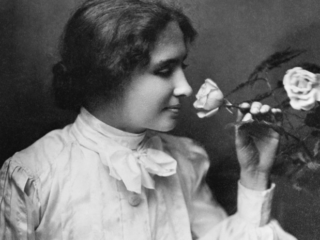
Helen Keller is a stunning example of human resilience
It’s hard for people with a typical understanding of our senses to grasp what life would really be like without sight or sound. Most people will experience a gradual yet normal decline in their visual and hearingl capabilities throughout the course of their lives, but according to the National Consortium on Deaf-Blindness, only about 40,000 adults in the United States experience our world without vision or hearing.
Helen Keller is a famous example of a person who lived with this impairment and made a life championing those who shared her experience. Her life is undoubtedly a testament to the resilience of human beings, but what has she said about this experience and what can we learn from it?
Keller has scores of inspirational quotes that make the difficult days go down smoother, but to us, there is one that stands out most.
“Blindness cuts us off from things, but deafness cuts us off from people.”
Deeply potent in its simplicity, this quote describes the challenges of this silent and blurred world for those who often take it for granted. For Keller, breaking through the barrier that kept her from the sensed world was impossible, but early in her life, she learned that it was possible to create a new world for herself and those who shared her experience.
When she was a child, she lost her vision and hearing after contracting what many believe to have been scarlet fever. She spent those early days frustrated and confused but meeting Anne Sullivan, a young teacher from the Perkins Institution for the Blind in Boston, changed everything.
With Sullivan’s tutelage, Keller was eventually able to associate objects with words using fingerspelling, read sentences using Braille, and make her own sentences by arranging words within a frame.
Her experience, though deeply fulfilling, brought about discrimination from those who didn’t understand her, so she made it her life mission to deconstruct the taboos that held her and so many others back, including atypical speech patterns.
She once said, “It is not blindness or deafness that bring me my darkest hours. It is the acute disappointment in not being able to speak normally. Longingly I feel how much more good I might have done, if I had only acquired natural speech. But out of this sorrowful experience I understand more fully all human striving, vaunted ambitions, and the infinite capacity of hope.”
In her deafness, she lost “the most vital stimulus — the sound of the voice that brings language, sets thoughts astir and keeps us in the intellectual company of man,” but in that vacant space, she was able to discover frequencies of the human experience untapped by even the greatest men or women.
Today, we are lucky enough to utilize technology as a way of bypassing the barriers that prevent those with hearing or vision loss from participating in society. If Helen Keller were born today, she would have the opportunity to opt in for a cochlear implant and speech therapy, and based on the tenor of her work, she would have likely embraced it.
Despite saying she could have done “much more good” if she had typical speech patterns, Keller’s influence on the deaf and blind communities and the world is undeniable and everlasting.
